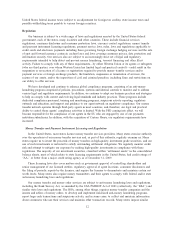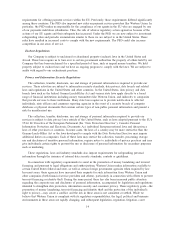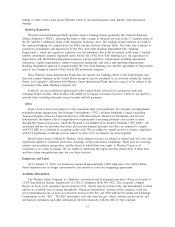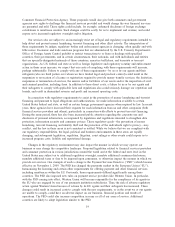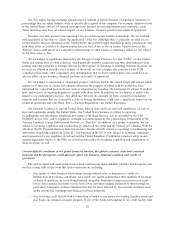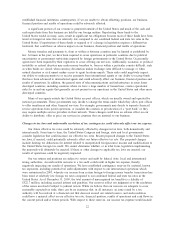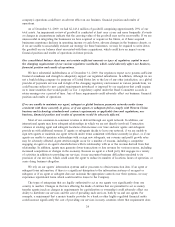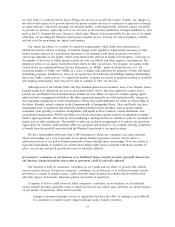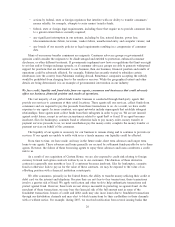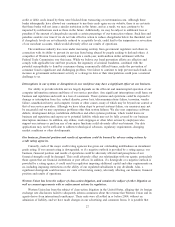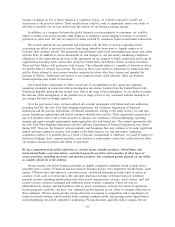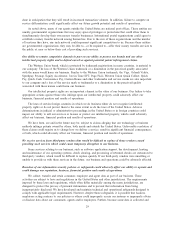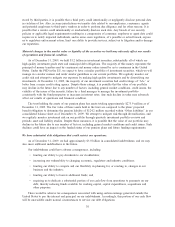Western Union 2009 Annual Report Download - page 36
Download and view the complete annual report
Please find page 36 of the 2009 Western Union annual report below. You can navigate through the pages in the report by either clicking on the pages listed below, or by using the keyword search tool below to find specific information within the annual report.established financial institution counterparties. If we are unable to obtain offsetting positions, our business,
financial position and results of operations could be adversely affected.
A significant portion of our revenue is generated outside of the United States and much of the cash and
cash equivalents from this business are held by our foreign entities. Repatriating these funds to the
United States would, in many cases, result in significant tax obligations because most of these funds have been
taxed at foreign tax rates that are relatively low compared to our combined federal and state tax rates in the
United States. If repatriation of these funds is required or if a change in legislation requires a different tax
treatment, that could have an adverse impact on our business, financial position and results of operations.
Money transfers and payments to, from or within or between countries may be limited or prohibited by
law. At times in the past, we have been required to cease operations in particular countries due to political
uncertainties or government restrictions imposed by foreign governments or the United States. Occasionally
agents have been required by their regulators to cease offering our services. Additionally, economic or political
instability or natural disasters may make money transfers to, from or within a particular country difficult, such
as when banks are closed, when currency devaluation makes exchange rates difficult to manage or when
natural disasters or civil unrest makes access to agent locations unsafe. These risks could negatively impact
our ability to make payments to or receive payments from international agents or our ability to recoup funds
that have been advanced to international agents and could adversely affect our business, financial position and
results of operations. In addition, the general state of telecommunications and infrastructure in some lesser
developed countries, including countries where we have a large number of transactions, creates operational
risks for us and our agents that generally are not present in our operations in the United States and other more
developed countries.
Many of our agents outside the United States are post offices, which are usually owned and operated by
national governments. These governments may decide to change the terms under which they allow post offices
to offer remittances and other financial services. For example, governments may decide to separate financial
service operations from postal operations, or mandate the creation or privatization of a “post bank” or they
may require multiple service providers in their network. These changes could have an adverse effect on our
ability to distribute, offer or price our services in countries that are material to our business.
Changes in tax laws and unfavorable resolution of tax contingencies could adversely affect our tax expense.
Our future effective tax rates could be adversely affected by changes in tax laws, both domestically and
internationally. From time to time, the United States Congress and foreign, state and local governments
consider legislation that could increase our effective tax rates. Recent proposed changes to the United States
tax laws, if enacted, could potentially adversely affect our future effective tax rate. The proposed changes
include limiting tax deductions for interest related to unrepatriated foreign-source income and modifications to
the United States foreign tax credit. We cannot determine whether, or in what form, legislation implementing
the proposals will ultimately be enacted. If these or other changes to applicable tax laws are enacted, our
results of operations could be negatively impacted.
Our tax returns and positions are subject to review and audit by federal, state, local and international
taxing authorities. An unfavorable outcome to a tax audit could result in higher tax expense, thereby
negatively impacting our results of operations. We have established contingency reserves for material, known
tax exposures, including potential tax audit adjustments with respect to our international operations which
were restructured in 2003, whereby our income from certain foreign-to-foreign money transfer transactions has
been taxed at relatively low foreign tax rates compared to our combined federal and state tax rates in the
United States. As of December 31, 2009, the total amount of unrecognized tax benefits is a liability of
$522.7 million, including accrued interest and penalties. Our reserves reflect our judgment as to the resolution
of the issues involved if subject to judicial review. While we believe that our reserves are adequate to cover
reasonably expected tax risks, there can be no assurance that, in all instances, an issue raised by a tax
authority will be resolved at a financial cost that does not exceed our related reserve, and such resolution
could have a material affect on our effective tax rate, financial position, results of operations and cash flows in
the current period and/or future periods. With respect to these reserves, our income tax expense would include
22


